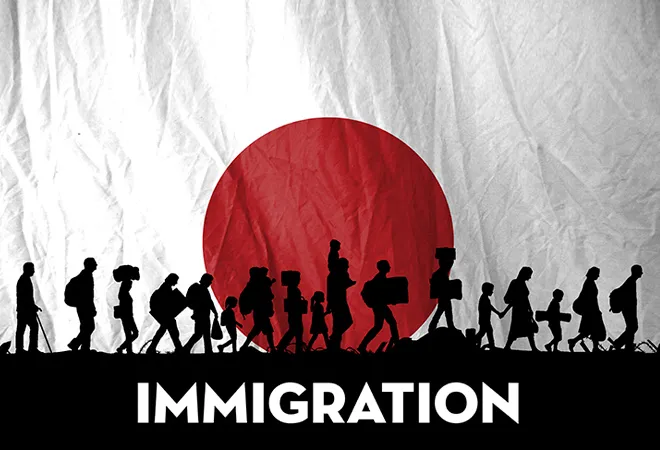
Japan, the third largest economy of the world, has been wrestling with a serious demographic challenge for years now. As the nation’s population is aging and shrinking, there is an increased need for responding to the labour shortage. More than 20 per cent of Japan’s population is over 65 years old. The share of elderly people in Japan is highest in the world. In November 2018, Japan’s lower house passed a new regulation, authorising the entry of more foreign workers into the country, which will be implemented in April 2019. Opposition parties went to extremes to prevent the law from being enforced. They believe that the law has risks of exposing the foreigners to exploitation.
Japan has been a country, which promotes ethnic homogeneity and its own culture by discouraging immigrants. It has maintained a mono-cultural identity of its own in the world for long. However, in the 1990s, Japan faced serious labour shortages due to which it revised its immigration rules to offer long term and renewable visas to the descendants of Japanese immigrants who had moved to Latin America after World War II. Since Japan’s population is shrinking and ageing, the administration finds it difficult to balance its conservative views on immigration with the need for younger and skilled workers to boost the Japanese economy. Therefore, the nation has come up with the idea of allowing more foreign workers. The regulation, which will come into effect in April 2019, would create two residence/visa status types for foreign individuals working in sectors that are suffering from labour shortages. The first category of visa would be renewable for up to five years and applicants must have a certain level of skill and experience in their field. Workers in this category would not be permitted to bring their family members into the country. The second category of visa would be renewable indefinitely for workers with valid employment contracts and would require higher level of skills and competency. In this category, workers are allowed to bring their families along. Chief Cabinet Secretary Yoshihide Suga said, “Creating a new residence status to accept foreign workers is of utmost importance as the nation’s population declines and businesses suffer from lack of personnel.”
Japan has been a country, which promotes ethnic homogeneity and its own culture by discouraging immigrants. It has maintained a mono-cultural identity of its own in the world for long.
It is widely believed that if the new immigration policy is implemented, the foreign workers will be facilitated to work in the newly accepted sectors like construction, farming, nursing, trade and finance professionals, consultants and analysts. These sectors have been identified as suffering the most from labour shortages. Furthermore, the policy will prove to be a major departure from the earlier policy of accepting less number of foreign workers with highly professional skills. With this new policy, PM Shinzo Abe has sought to think about something unforeseen, that is, immigration of more foreign workers to address the labour shortage. He also believes that in the new system workers will work in sectors suffering labour shortages for a limited time. Moreover, opposition parties and experts have criticised the new visa system even though it tries to address the problem of labour shortage. The opposition has also argued that the influx of foreign workers will lead to the exploitation of the migrant labour and may depress the wages.
There are certain constraints and challenges for those coming to Japan to work. One of the constraints could be the Japanese language ability. Japanese language seems to be indispensable for a foreign worker living in Japan. Since Tokyo is planning to welcome more foreign workers, it is essential to build a system where immigrants are taught the language, culture and customs. Japan’s tough working conditions and exploitation of the immigrants is another major challenge, which is of growing concern. Foreign nationals have been experiencing mistreatment in the Technical Intern Trainee Program (TITP).It was introduced in 1993 for foreign nationals, mostly from China and Southeast Asia but the internship was misused to provide cheap labour. There are also severe allegations of the human rights violations, which include below-minimum wages, bullying and sexual harassment by employers along with long working hours. Lack of communication skills and Tokyo’s harsh working conditions could prove to be a frustrating combination. Moreover, the question of how to treat foreign workers and to assure them their legitimate rights needs to be well thought out. Prime Minister Shinzo Abe has stressed the proposed law is not an overhaul of immigration policy and Japan will only accept foreigners “who have specific skills and can work immediately to address serious labour shortages, only in sectors that genuinely need them.”
There are certain constraints and challenges for those coming to Japan to work. One of the constraints could be the Japanese language ability.
Japan’s unwillingness to accept immigrants initially, points out that no government funds are allocated for integration efforts and there is no such law against discrimination of foreigners. It is undoubtedly true that Japan is in need for a concrete solution for the labour shortage and that solution likely comes out to involve foreign workforce. For foreign workers to feel motivated and secure in Japan, Japanese companies shall treat foreign employees in the same manner they treat Japanese employees.
Since the 2020 Olympics is to be held in Tokyo, the Abe administration is working on inbound tourism so that they have more foreigners and is working towards relieving the labour shortage. Despite the Japanese government’s reluctance to increase the number of foreign workers, the rapidly declining and aging population of the country makes it impossible for the government to ignore the issue. Now that the bill for a new policy has been enacted, the attention shall solely be focused on creating an inclusive society wherein Japanese and foreign workers can coexist. It is vital to create an environment in which foreign residents can live at peace without discrimination to maintain a safe and stable life. What is worrisome is that the government’s explanation on how to accept more foreign workers is still not properly articulated. The government estimates that around 340,000 foreign workers could possibly enter Japan in the five year after the law takes effect in April. How PM Abe implements the previously unthinkable immigration policy remains to be seen.
The views expressed above belong to the author(s). ORF research and analyses now available on Telegram! Click here to access our curated content — blogs, longforms and interviews.




 PREV
PREV


